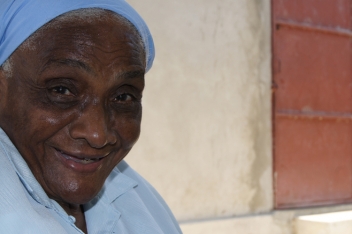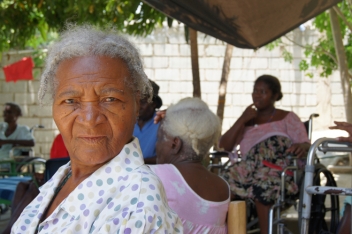 Today we’re visiting two of the care homes we’re supporting in Leogane, about 90 minutes from Port-au-Price and the town that was the epicentre of the earthquake.
Today we’re visiting two of the care homes we’re supporting in Leogane, about 90 minutes from Port-au-Price and the town that was the epicentre of the earthquake.
Sister Josette (right) was living in the sisters’ quarters but since the earthquake she’s been sleeping in a tent at night. She’s 81.
“No pensions or health services”
“I started working here at Villa de Jesu with two others shortly after it was founded in 1999. There are no social services in Haiti, nothing organised in terms of pensions or health services. There is no support for people when they can no longer work.
“Teachers, doctors, nurses, of course will have pensions – but not people who worked more informally throughout their lives. In the US for example, there’s social security if you can’t support yourself. We need this in Haiti.
 Older people abandoned
Older people abandoned
“Over the last few years, we see more abandonment of older people, and greater need for these homes. Before, people would have been ashamed to leave their parents here, but now things are different.
“Very few of the women residents here (like Marinatha, 79, right) have visitors anymore.”
This is a common view that things have got worse for many older people in recent years. Sister Claudette at neighbouring Asile Vincent de Paul nursing home reiterated that sentiment, telling us that the burden of caring for an older parent or relative was just becoming too much for many people struggling to make ends meet.
Migration and poverty are the two main reasons for the increase in the numbers coming to these care homes. Still, in broader society the vast majority of older people are still living in their families and communities.
“Older people and children don’t mix”
There’s a school next door to the Asile Villa de Jesu. “We don’t mix the children with the older people very much. Yes, sometimes for special occasions like Mardi Gras or Carnival, but not usually. Children don’t understand and sometimes make fun of the older people.”
This seems disheartening to me. And I wonder if there could be more intergenerational contact. Sister Josette puts it down to “too much difference in Haitian society”.
Sister Josette’s younger colleague Sister Merune says: “Older people who have the means – they can pay people to look after them. If you’re not from a well off family in Haiti, you have little value. “
“The young could learn so much from older people”
Sister Josette glances at my T-shirt with the HelpAge logo. “I like your name ‘HelpAge'”, she smiles, “it’s a good name.” I show her the strapline that says “age helps” and what it means to us as an organisation. Do people appreciate the contribution older people make to society in Haiti, I ask her?
“No, and it’s a shame, as young people could learn so much from us. Older people learn from younger people all the time. I ask for younger people’s opinion all the time. Just because you’re older doesn’t mean you have all the answers, but an exchange between the two is missing.”
Sister Merune agreed, saying: “My grandfather lived with us until he was 92. He taught me the history of my country. He told me about the first bus that came to Haiti, the first airplane. I loved hearing these stories, I valued them.”
Read more about HelpAge’s work in Haiti.
